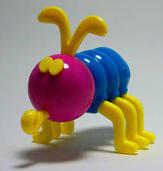weekly column
|
Each week, find a commentary on something connected to verses of Torah or another source of wisdom
|
|
Each week, find a commentary on something connected to verses of Torah or another source of wisdom
|
 The Leviticus:8 Project You shall not eat of their flesh or touch their carcasses; they are unclean for you. Leviticus 11:8 It was third or fourth grade and it just was not cool to like members of the opposite sex. There were a few long-time friends with whom we could interact somewhat privately, but otherwise no contact was permissible. They had cooties. You probably know variations. Sometimes it was the sloppy kids. Sometimes it was the clumsy kids. Sometimes it was the socially awkward kids. I know that among some kids that cooties were attributed on the basis of race, native language, social or economic status or presumed ethnicity. Cooties were highly contagious; a single touch could infect you, a fact that the designated carriers who were brave enough used to terrorize the clique that tried to ostracize them. Getting rid of them required a cootie shot, generally administered by a friend with a slightly sadistic streak. There are real cooties – a fact I didn’t know when I was little, but that probably are the origin of the imaginary kind – and a game that involves building a plastic bug piece by piece. However, for kids, cooties were an exercise in exclusion. They were the pop culture version of the Bible’s uncleanliness. There has been a lot of ink spilled trying to explain the rules of ritual cleanliness in the Bible. Modern scholars no less than medieval ones have analyzed the types of situations that were considered to produce some type of pollutant. Like playground cooties, these ritual pollutants were not physical entities. Like playground cooties, they were highly contagious. Like playground cooties, there was a way to get rid of them, though it was much less sadistic than a “shot;” instead, it involved some combination of the passage of time and submersion in a pool of water collected in a specified way. Unlike playground cooties, however, there was a divine imprimatur on these pollutants. The person who touched a corpse or a carcass, or who had a flow of blood or other bodily effluence, or who displayed certain skin conditions, or engaged in certain other forbidden contacts was unclean and ostracized from the general population until the condition could be reversed. Ingrained in the consciousness of our tradition is the notion that it is forbidden to have contact with some people when they have these ritual cooties. To be sure, there are fellow Jews who take these restrictions very seriously. Most usual among the observances are men and women who will not touch a member of the opposite sex who is not an immediate relative. From the simple prohibition of shaking hands to the extreme practice of not sitting next to a stranger on an airplane, individuals who take literally these concerns will avoid the accidental contagion that might spread throughout the unsuspecting members of the pious community. There are many of us – including me – who find this obsession absurd, but there is no denying that it is consistent with a world view of a certain kind. Here, however, is the one thing that I believe is undeniable. Like cooties, and despite the Bible’s insistence on a divine source for ritual pollution, this contagion is made up. That is to say, without an acceptance of the spiritual biases that seem to necessitate ritual pollution, the “disease” is an illusion. (Allow me a quick disclaimer, please. If you believe literally in the Biblical and rabbinical categories of tum’ah (pollution) and taharah (cleansing), then the categories are very real to you, which I do not challenge. I accept a metaphorical assessment of those categories and of the rituals associated with them. That is to say, I will shake the hand of any willing person and sit in my assigned seat.) That illusion begins with a bias that translates into real human consequences. A dead bird or moldy wall, both carriers of uncleanliness, does not care one iota if it is sequestered. But a human being who does not share the necessary bias most certainly does. Playground cooties are cruel devices of exclusion, and almost every child grows out of them. But some children do not, and they carry that prejudice from playgrounds to borders and schools and gated communities and commercial businesses. The presumption that all people in specific categories carry disqualifying blemishes seems to be animating much behavior in our country – contrary to both our founding documents and what (ought to be) established law. Families fleeing oppression and danger to our southern borders are infested with criminal motive and cultural imperialism. Drivers, pedestrians and children on their way to school with darker skin are possessed of darker motives than simply getting from here to there. Anyone who prays five times a day in Arabic is infected with a bloodlust for Americans who spend Sunday morning in worship. And a man who loves a man or a woman who loves a woman can cause cakes to fall, flowers to wilt and calligraphers to lose their skill. Playground cooties should not be taken seriously by anyone who has completed fourth grade, absent a long tradition of recess with aging classmates. The roots of discrimination and exclusion begin with that game. Every teacher in middle school knows it. Those boys and girls who hope for friendships outside the few figure it out, and the rest deserve patient weaning. As for those who just can’t give it up, let’s keep them away from making and enforcing public policy.
1 Comment
|
Archives
October 2023
Categories |